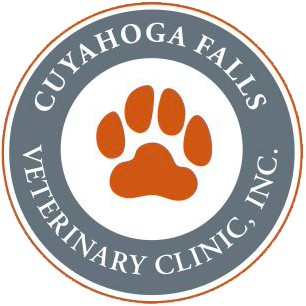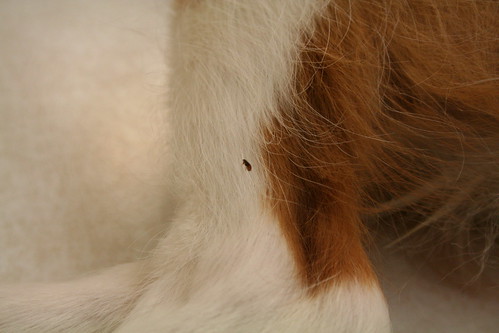We at the Cuyahoga Falls Veterinary Clinic have decided to move from Sentinel to Trifexis when it comes to an oral heartworm / intestinal parasite / flea treatment. Many of our patients have made this transition very smoothly and we’ve had this conversation with many of our owners face to face. But for those of you who found our blog, read the title and said, “Trifexis? What’s Trifexis?” this post is for you.
Our decision to phase away from Sentinel was not made lightly. We’ve been very, very happy with Sentinel as a heartworm preventive and as an intestinal parasite and flea control treatment for many, many years. Dr. Ryan has used Sentinel with his dogs, Kyra, Bridget, Betty and Gretel, without complaint.
|
Before we get into the details, we want to communicate a very clear message to our pet-owners who have used Sentinel: We are moving to a treatment that does everything the previous treatment did, and also kills fleas! Why would we not make this recommendation? Veterinary medicine, like its human counterpart, experiences progress as time goes by. Trifexis is the latest example of progress in treatment, as Trifexis offers everything that Sentinel provides… and more.
For our readers who are not interested in the details, the above explains our decision in a nutshell. If, however, you are interested in the details, read on…
The active ingredient for heartworm and intestinal parasite prevention is the same in both Sentinel and Trifexis: milbemycin oxime. Both Sentinel and Trifexis have similar label claims when it comes to heartworms and they have the same label claim with regard to roundworms, hookworms and whipworms. Ultimately, our move to Trifexis has nothing to do with internal parasites.
The benefit that Trifexis provides that Sentinel does not is: Trifexis kills fleas.
|
Sentinel contains a flea control product, lufenuron, that inhibits flea egg development. Lufenuron (originally released as Program) is good because it prevents an animal’s environment from becoming infested with fleas. It was literally the first treatment of its kind, its safety was unmatched and when Program first hit the market, veterinarians couldn’t keep it on the shelf and the pet-owning population couldn’t get enough of it. Lufeneron, however, doesn’t kill fleas. If a pet goes to an area and has 30 fleas jump on, while those fleas won’t contaminate the pet’s home environment, that pet will still be itchy. That’s why we’ve used safe flea-kill products like Frontline in addition to the oral heartworm preventives. But for the owners who do not want to use topical products or for the owners who only want one treatment to remember as opposed to two, Sentinel didn’t completely meet their desires.
Enter Trifexis. The active ingredient in Trifexis to combat fleas is spinosad. Spinosad has been available as a stand-alone oral treatment called Comfortis for a few years now. Where lufenuron prevents flea eggs from maturing, spinosad kills fleas. It begins killing fleas within 30 minutes, so not only are fleas dead before they can lay eggs, they’re dead soon so they don’t continue to chew on cats and dogs for hours before they die.
We are not convinced that there is one parasite-control drug that is right for all dogs in all circumstances. That is why we also use ProHeart 6, Revolution and Interceptor for heartworm prevention, etc. If you have questions about any of these treatments or if you’re wondering which is right for your dog, we’d be happy to talk with you about the answers to your questions.
Our move from Sentinel to Trifexis fits with our mission of providing kind, compassionate and comprehensive health care for our patients. When a better product, treatment or procedure comes along, we make it our priority to make it available to our patients.
UPDATE:
Sentinel has returned. The manufacturer, Novartis, discontinued the production of Interceptor (milbemycin) and dropped Sentinel (milbemycin & lufeneron) into Interceptor’s cost range. It doesn’t make sense to spend money on Heartgard, Iverhart or the other internal-only parasites when the same dollars could be spent with some degree of flea control. There’s no better oral heartworm preventive/intestinal parasite control than milbemycin, and for these reasons, we’ve brought Sentinel back to our shelves.




The Cuyahoga Falls Veterinary Clinic | Animal Wellness | Medical Services | Pet Services
[…] oxime) is very effective against the common types of intestinal parasites that dogs can find. Trifexis has label claims against roundworms, hookworms and whipworms. When used monthly, Trifexis will protect your dog and […]
Kathy
is trifexis safe to give a dog on chemotherapy for lymphoma? thank you
Dr. Ryan Gates
Trifexis has not been studied in patients being treated for lymphoma. From the label: “Trifexis was tested in pure and mixed breeds of healthy dogs in well-controlled clinical and laboratory studies.” Use in such dogs would be considered off-label, and should only be done after consulting your veterinarian with whom you have a VCPR.